初中英语动词时态专题
- 格式:docx
- 大小:23.32 KB
- 文档页数:7

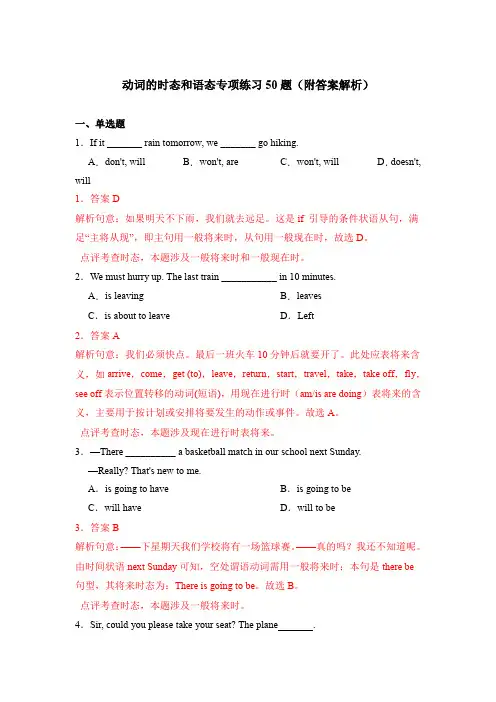
动词的时态和语态专项练习50题(附答案解析)一、单选题1.If it _______ rain tomorrow, we _______ go hiking.A.don't, will B.won't, are C.won't, will D.doesn't, will1.答案D解析句意:如果明天不下雨,我们就去远足。
这是if 引导的条件状语从句,满足“主将从现”,即主句用一般将来时,从句用一般现在时,故选D。
点评考查时态,本题涉及一般将来时和一般现在时。
2.We must hurry up. The last train ___________ in 10 minutes.A.is leaving B.leavesC.is about to leave D.Left2.答案A解析句意:我们必须快点。
最后一班火车10分钟后就要开了。
此处应表将来含义,如arrive,come,get (to),leave,return,start,travel,take,take off,fly,see off表示位置转移的动词(),用现在进行时(am/is are doing)表将来的含义,主要用于按计划或安排将要发生的动作或事件。
故选A。
点评考查时态,本题涉及现在进行时表将来。
3.—There __________ a basketball match in our school next Sunday.—Really? That's new to me.A.is going to have B.is going to beC.will have D.will to be3.答案B解析句意:——下星期天我们学校将有一场篮球赛。
——真的吗?我还不知道呢。
由时间状语next Sunday可知,空处谓语动词需用一般将来时;本句是there be句型,其将来时态为:There is going to be。
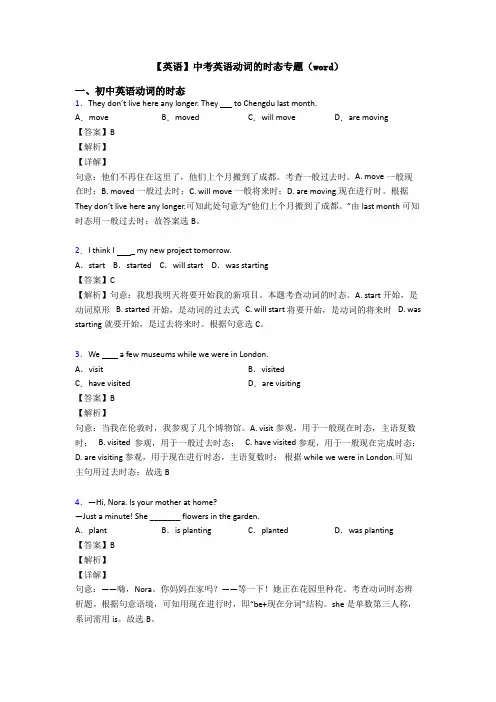
【英语】中考英语动词的时态专题(word)一、初中英语动词的时态1.They don’t live here any longer. They to Chengdu last month.A.move B.moved C.will move D.are moving【答案】B【解析】【详解】句意:他们不再住在这里了,他们上个月搬到了成都。
考查一般过去时。
A. move一般现在时;B. moved一般过去时;C. will move一般将来时;D. are moving现在进行时。
根据They don’t live here any longer.可知此处句意为“他们上个月搬到了成都。
”由last month可知时态用一般过去时;故答案选B。
2.I think I _ my new project tomorrow.A.start B.started C.will start D.was starting【答案】C【解析】句意:我想我明天将要开始我的新项目。
本题考查动词的时态。
A. start 开始,是动词原形 B. started 开始,是动词的过去式 C. will start 将要开始,是动词的将来时 D. was starting就要开始,是过去将来时。
根据句意选C。
3.We a few museums while we were in London.A.visit B.visitedC.have visited D.are visiting【答案】B【解析】句意:当我在伦敦时,我参观了几个博物馆。
A. visit 参观,用于一般现在时态,主语复数时; B. visited 参观,用于一般过去时态; C. have visited 参观,用于一般现在完成时态;D. are visiting 参观,用于现在进行时态,主语复数时;根据 while we were in London.可知主句用过去时态;故选B4.—Hi, Nora. Is your mother at home?—Just a minute! She _______ flowers in the garden.A.plant B.is planting C.planted D.was planting【答案】B【解析】【详解】句意:——嗨,Nora。
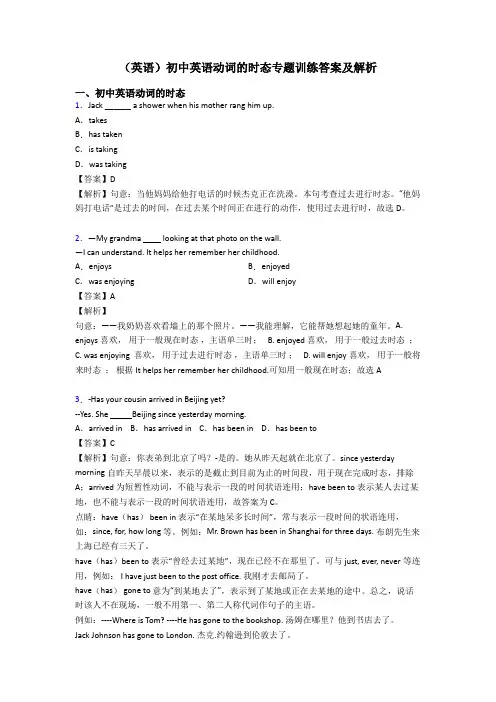
(英语)初中英语动词的时态专题训练答案及解析一、初中英语动词的时态1.Jack ______ a shower when his mother rang him up.A.takesB.has takenC.is takingD.was taking【答案】D【解析】句意:当他妈妈给他打电话的时候杰克正在洗澡。
本句考查过去进行时态。
“他妈妈打电话”是过去的时间,在过去某个时间正在进行的动作,使用过去进行时,故选D。
2.—My grandma looking at that photo on the wall.—I can understand. It helps her remember her childhood.A.enjoys B.enjoyedC.was enjoying D.will enjoy【答案】A【解析】句意:——我奶奶喜欢看墙上的那个照片。
——我能理解,它能帮她想起她的童年。
A. enjoys喜欢,用于一般现在时态,主语单三时; B. enjoyed 喜欢,用于一般过去时态;C. was enjoying 喜欢,用于过去进行时态,主语单三时;D. will enjoy喜欢,用于一般将来时态;根据It helps her remember her childhood.可知用一般现在时态;故选A3.-Has your cousin arrived in Beijing yet?--Yes. She Beijing since yesterday morning.A.arrived in B.has arrived in C.has been in D.has been to【答案】C【解析】句意:你表弟到北京了吗?-是的。
她从昨天起就在北京了。
since yesterday morning自昨天早晨以来,表示的是截止到目前为止的时间段,用于现在完成时态,排除A;arrived为短暂性动词,不能与表示一段的时间状语连用;have been to表示某人去过某地,也不能与表示一段的时间状语连用,故答案为C。
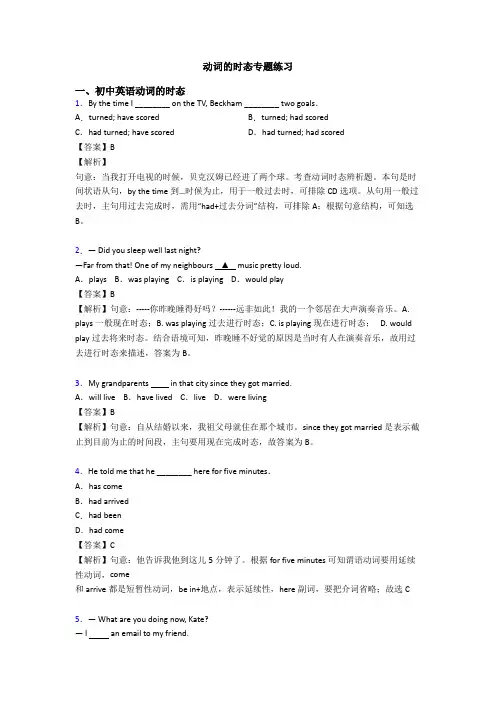
动词的时态专题练习一、初中英语动词的时态1.By the time I ________ on the TV, Beckham ________ two goals.A.turned; have scored B.turned; had scoredC.had turned; have scored D.had turned; had scored【答案】B【解析】句意:当我打开电视的时候,贝克汉姆已经进了两个球。
考查动词时态辨析题。
本句是时间状语从句,by the time到…时候为止,用于一般过去时,可排除CD选项。
从句用一般过去时,主句用过去完成时,需用“had+过去分词”结构,可排除A;根据句意结构,可知选B。
2.— Did you sleep well last night?—Far from that! One of my neighbours ▲ music pretty loud.A.plays B.was playing C.is playing D.would play【答案】B【解析】句意:-----你昨晚睡得好吗?------远非如此!我的一个邻居在大声演奏音乐。
A. plays一般现在时态;B. was playing 过去进行时态;C. is playing 现在进行时态; D. would play过去将来时态。
结合语境可知,昨晚睡不好觉的原因是当时有人在演奏音乐,故用过去进行时态来描述,答案为B。
3.My grandparents in that city since they got married.A.will live B.have lived C.live D.were living【答案】B【解析】句意:自从结婚以来,我祖父母就住在那个城市。
since they got married是表示截止到目前为止的时间段,主句要用现在完成时态,故答案为B。
4.He told me that he ________ here for five minutes.A.has comeB.had arrivedC.had beenD.had come【答案】C【解析】句意:他告诉我他到这儿5分钟了。
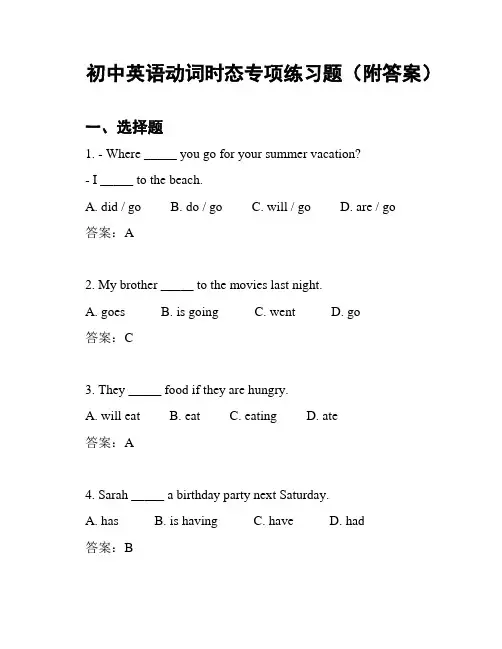
初中英语动词时态专项练习题(附答案)一、选择题1. - Where _____ you go for your summer vacation?- I _____ to the beach.A. did / goB. do / goC. will / goD. are / go答案:A2. My brother _____ to the movies last night.A. goesB. is goingC. wentD. go答案:C3. They _____ food if they are hungry.A. will eatB. eatC. eatingD. ate答案:A4. Sarah _____ a birthday party next Saturday.A. hasB. is havingC. haveD. had答案:B5. I _____ Chinese for three years.A. studyB. studiedC. studyingD. have studied 答案:D二、填空题1. My father _____ a doctor in the hospital.答案:is2. ______ you at the park last evening?答案:Were3. She always ______ her homework after school.答案:does4. I _____ my best friend next week.答案:will meet5. They _____ to the zoo last Sunday.答案:went三、改错题1. She go to school by bus every day.答案:go → goes2. They is playing basketball in the gym.答案:is → are3. I am not speak English very well.答案:am not → do not4. Where did you go yesterday night?答案:night → evening5. We have learn English since we were young.答案:learn → learned以上就是初中英语动词时态专项练习题及答案,希望能对你有所帮助。
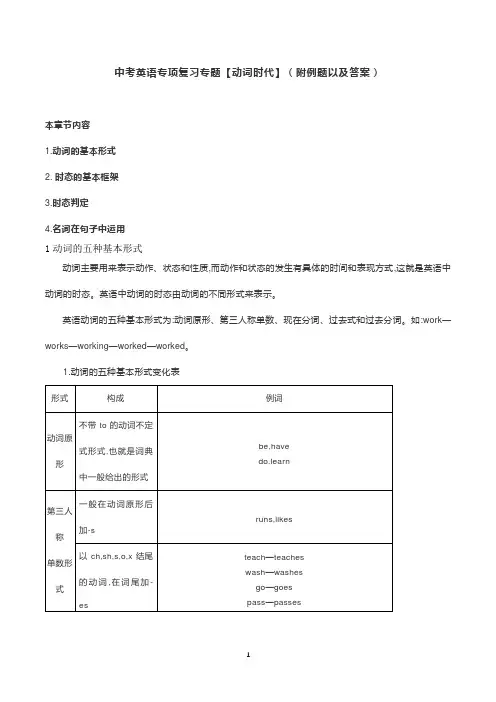
中考英语专项复习专题【动词时代】(附例题以及答案)本章节内容1.动词的基本形式2. 时态的基本框架3.时态判定4.名词在句子中运用1动词的五种基本形式动词主要用来表示动作、状态和性质,而动作和状态的发生有具体的时间和表现方式,这就是英语中动词的时态。
英语中动词的时态由动词的不同形式来表示。
英语动词的五种基本形式为:动词原形、第三人称单数、现在分词、过去式和过去分词。
如:work—works—working—worked—worked。
1.动词的五种基本形式变化表2时态的基本框架常见六种时态的构成及用法(1)一般现在时用法:①现在经常性的状态或动作;②客观事实和真理。
构成:①be+表语;②实义动词作谓语标志词:often, sometimes, usually, always, never,twice a month, every day/week/month/year(every系列)例句:He usually gets to school early.他通常很早到校。
The moon moves around the earth.月亮绕着地球转。
练一练1.认识从实践开始Knowledge practice.2.如果明天下雨,我们就不去公园了。
If it tomorrow,we to the park.【答案】1. begins with.2.rains,won’t go(2)一般过去时用法:表示过去的动作或状态。
构成:①was/were+表语;②实义动词作谓语标志词:a moment ago,just now,ago, yesterday, last night/week/month(last系列)例句:We went to Yunnan last Monday.上周一我们去了云南。
1.She (not visit)her aunt last weekend.2.My friend,Lucy, (study)for the math test and (practice)English last night. 【答案】1.didn’t visit 2.studied practiced(3)一般将来时用法:表示将来的动作或状态。
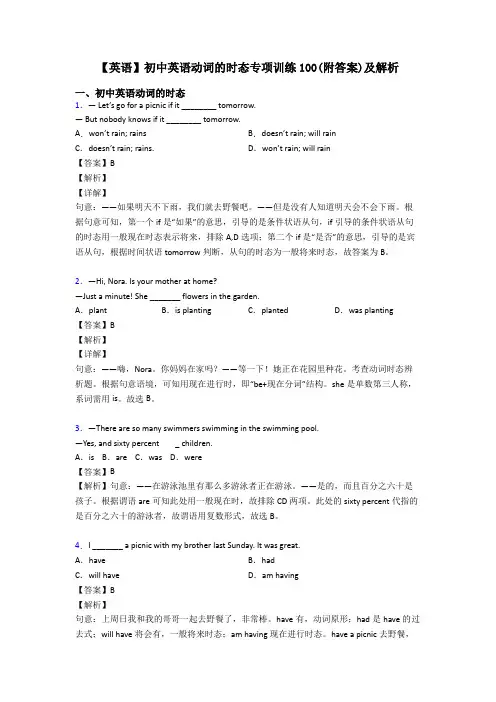
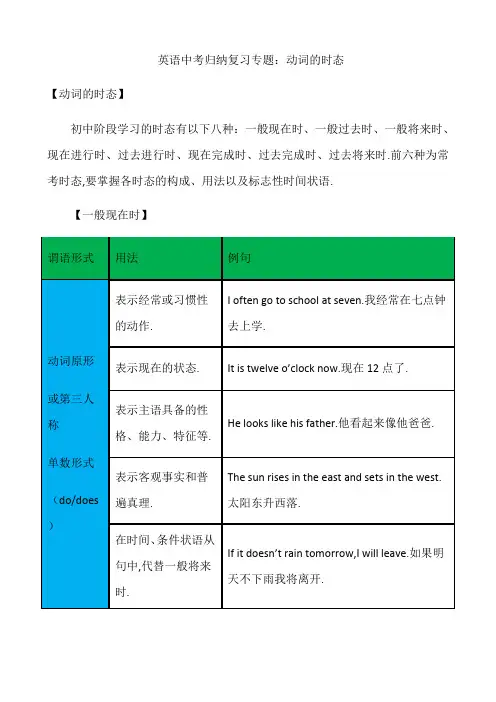
英语中考归纳复习专题:动词的时态【动词的时态】初中阶段学习的时态有以下八种:一般现在时、一般过去时、一般将来时、现在进行时、过去进行时、现在完成时、过去完成时、过去将来时.前六种为常考时态,要掌握各时态的构成、用法以及标志性时间状语.【一般现在时】【考点训练1】1.My father is a teacher and he _________ (teach) in a middle school.2.Yesterday the teacher told us the earth _______ (go) around the sun.3.—When shall we begin our meeting?—We’ll begin it when Helen ___ . ()esB.cameC.will comee4.—How do you usually go to school?—I usually ___ to school on foot. ()A.goB.wentC.was goingD.will go答案:teaches goes A A【一般过去时】要点提醒:“used to+动词原形”表示过去的习惯或状态.如:Mum used to tell us stories.妈妈过去常给我们讲故事.【考点训练2】1.Mike ________ (not go) to bed until 12 o’clock last night.2.He asked if I _____ (be) a student.3.Will you please say it again?I ___ quite ___ you.()A.don’t;hearB.didn’t;hearC.don’t;heardD.didn’t;heard4.He _____ go out with his parents,but now he ____ staying at home alone. ()ed to;is used toB.is used to;used toe to;is used toed to;used to答案:didn’t go was B A【一般将来时】要点提醒:be going to与will的区别1.be going to 指已计划好的事或思考过的意图、打算,will表示未事先思考或未计划而临时做出的决定.如:I’m going to see him tomorrow.我打算明天去看他.(事先经过思考)I’ll answer the door.我去开门.(未经事先考虑)2.be going to可表示客观迹象表明马上要发生的事,而will则表明说话者的主观意愿.如:Look at the clouds.There is going to be a storm.看看这些云,暴风雨就要来了.(客观迹象表明要发生)I hope it will be warm tomorrow.我希望明天会暖和起来.(主观意愿)3.在含有条件状语从句的复合句的主句中,一般用will,不用be going to. 如:I will come if it doesn’t rain.如果不下雨的话,我就来.【考点训练3】1.____ a concert in our school next Saturday. ()A.There isB.There areC.There will beD.There will have2.If they can arrive by 9:00 am,we ___ a meeting.()A.haveB.will haveC.hadD.would have3.He ___ her a beautiful hat on her next birthday.()A.givesB.gaveC.will givingD.is going to give答案:C B D 【现在进行时】【考点训练4】1.They ____________ (have) a math test in the classroom now.2.Look! He ___________ (lie) on the beach.3.—Pass the raincoat to me.It ___ hard now.—Here you are. ()A.rainB.is rainingC.rainedD.will rain4.—Cathy,can you answer the door?I ___ the room.—I’m coming,Mum. ()A.CleanB.cleanedC.have cleanedD.am cleaning答案:are having is lying B D【过去进行时】He was forever com plaining about something.他老是怨这怨那.要点提醒:1.在含有时间状语从句的复合句中,延续时间较长的动作常用过去进行时,另一个短暂性动作用一般过去时.如:When the UFO landed,I was shopping at the clothes store.当UFO落地时,我正在服装店买衣服.2.表示两个延续性动作在过去某一时刻同时进行,不考虑动作的先后顺序,主句和从句的谓语动词都用过去进行时,连词常用while.如:Tom was doing his homework while I was reading a newspaper.我在看报纸时,汤姆在做作业.【考点训练5】1.Mike and I ___________ (play) basketball at that time yesterday afternoon.2.While Mr.Johnson _______________ (work) in the office,the phone rang.3.The girl ___ for the bus when the rainstorm came.()A.waitedB.have waitedC.is waitingD.was waiting4.—Jenny,I called you at nine last night,but you didn’t pick up.—Oh,I ____ a popular program called Go Fighting!.()A.watchB.watchedC.was watchingD.am watching答案:were playing was working D C【现在完成时】要点提醒:1.have/has been to,have/has gone to与have/has been in(考点讲解详见P74考点1)2.延续性动词与非延续性动词英语中的动词按动作发生的方式、发生过程的长短可分为延续性动词和非延续性动词两种,非延续性动词也可称为短暂性动词或瞬间动词.在现在完成时态中,有时要将非延续性动词转换为延续性动词,这样才能和时间段连用.转换方法如下:(1)将短暂性动词转换为“be+形容词或副词”.请看下表:如:这间商店开门6小时了.The shop has opened for 6 hours.( ×)The shop has been open for 6 hours.( √)(2)有的短暂性动词可以转换为意思相同的延续性动词.请看下表:如:这本书我借了一个月了.I have borrowed the book for one month.( ×)I have kept the book for one month.( √)3.现在完成时与一般过去时的区别现在完成时强调某一动作或状态对现在造成的影响或结果,不能和表示过去的时间状语连用;一般过去时只表示过去的事实,不表示和现在的关系,可以和表示过去的时间状语连用.如I bought a ticket yesterday.我昨天买了一张票.(强调我昨天做的一件事是买票)I have already bought a ticket.我已经买了一张票.(强调我已经有票了,无须再惦记票的事了)4.现在完成时的其他句型【考点训练6】1.—you _____ your homework yet?—Yes.I ______ it a moment ago. ()A.Did;do;finishedB.Have;done;finishedC.Have;done;have finishedD.Will;do;finish2.His father ___ the Party since 1978. ()A.joinedB.has joinedC.was inD.has been in3.Miss Green isn’t in the office.She to the library. ()A.has goneB.wentC.will goD.has been 答案:B D A【过去完成时】had + 过去分词表示在过去的过去发生的动作或存在的状态.I had had three pieces of cake when you arrived.你来的时候我已经吃了三块蛋糕了.表示过去某一动作或状态持续到过去另一时间.The old man had lived in Shanghai for ten years beforeTom came here.汤姆来这儿之前,这个老人已经住在上海十年了.时间标志by the time...,before,when等构成的短语或引导的从句【考点训练7】1.在我们到达电影院之前,电影已经开始了.The film __________ before we _______ to the cinema.2.警察赶到时,小偷已经逃跑了.When the police __________,the thief____________________ .答案:had begun got arrived had run away 【过去将来时】【考点训练8】1.李明说如果布莱恩下个月来中国,他将会很高兴.Li Ming said he ___________ happy if Brian came to China the next month.2.蒂娜说她下周三打算来参加我的生日派对.Tina said she ________________ my birthday party the next Wednesday.答案:would be was going to【中考示例】(2017·广西)If he _____ Guilin,he’ll probably go to Yangshuo. ( )A.visitsB.is visitingC.will visitD.has visited【解析】考查动词的时态.句意:如果他游览桂林,他有可能会去阳朔.if引导条件状语从句时,时态遵循“主将从现”原则,从句中用一般现在时表示将来.【考题热身】1.(2017·甘肃)I promise I ________ (send) you an email to explain all of these tomorrow.2.(2017·甘肃)Be quiet! The patients ______________(sleep).3.(2017·鄂州)Sandy’s grandparents__________________ (marry) for 50 years.4.(2017·台州改编)A true friend always ____________(support) you whenever youare in trouble.5.(2017·宿迁)I ______________(wash) the dishes while my sister was sweeping the floor.6.(2017·云南)—What do you think of your hometown, Kate?—It a lot.It’s more beautiful than before. ()A.has changedB.changesC.will changeD.change7.(2017·武汉)—Linda is not coming for the party tonight.—But she ______!()A.promisesB.promisedC.will promiseD.had promised8.(2017·毕节)It’s nice to see you again.We ___ each other since 2016. ()A.won’t seeB.haven’t seenC.don’t seeD.didn’t see9.(2017·黔东南)If it doesn’t rain this weekend,we ___ a picnic in the Jinquan Park. ()A.haveB.will haveC.have hadD.had10.(2017·上海)Some exchange students ___ with their host families this time yesterday. ()A.are chattingB.will chatC.were chattingD.have chatted11.(2017·重庆B卷)—Where is your uncle?I haven’t seen him for a long time. —He _____ Beijing for about half a year.He moved there in January. ()A.has gone to B.has been toC.has arrived inD.has been in12.(2017·重庆B卷)John and I ___ to visit his grandparents last Sunday afternoon. ()A.goB.wentC.will goD.have gone13.(2017·重庆A卷)In the past few years,many schools ____ the ways of doing morning exercises. ()A.changeB.changesC.will changeD.have changed14.(2017·重庆A卷)As soon as the rain _____ ,they will go out to pick apples. ()A.stopsB.stoppedC.will stopD.is stopping15.(2017·河北)Don’t take the dictionary away.I ___ it. ()eedC.am usingD.have used答案:will send are sleeping have been married supports A B BBCDBDAC。
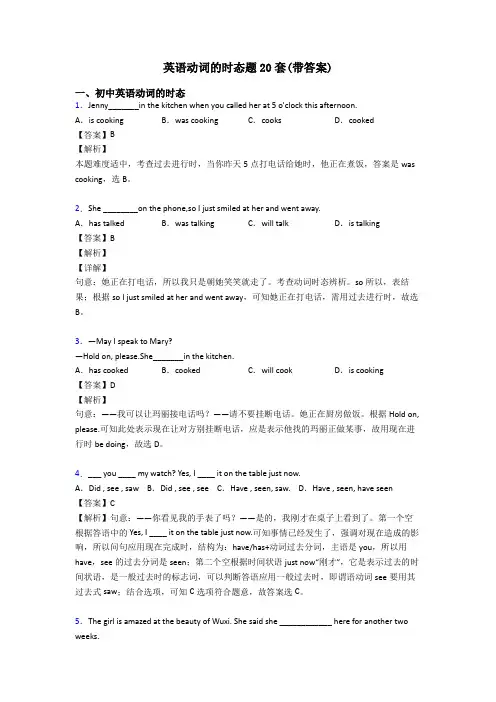
英语动词的时态题20套(带答案)一、初中英语动词的时态1.Jenny_______in the kitchen when you called her at 5 o'clock this afternoon.A.is cooking B.was cooking C.cooks D.cooked【答案】B【解析】本题难度适中,考查过去进行时,当你昨天5点打电话给她时,他正在煮饭,答案是was cooking,选B。
2.She ________on the phone,so I just smiled at her and went away.A.has talked B.was talking C.will talk D.is talking【答案】B【解析】【详解】句意:她正在打电话,所以我只是朝她笑笑就走了。
考查动词时态辨析。
so所以,表结果;根据so I just smiled at her and went away,可知她正在打电话,需用过去进行时,故选B。
3.—May I speak to Mary?—Hold on, please.She_______in the kitchen.A.has cooked B.cooked C.will cook D.is cooking【答案】D【解析】句意:——我可以让玛丽接电话吗?——请不要挂断电话。
她正在厨房做饭。
根据Hold on, please.可知此处表示现在让对方别挂断电话,应是表示他找的玛丽正做某事,故用现在进行时be doing,故选D。
4.___ you ____ my watch? Yes, I ____ it on the table just now.A.Did , see , saw B.Did , see , see C.Have , seen, saw. D.Have , seen, have seen【答案】C【解析】句意:——你看见我的手表了吗?——是的,我刚才在桌子上看到了。
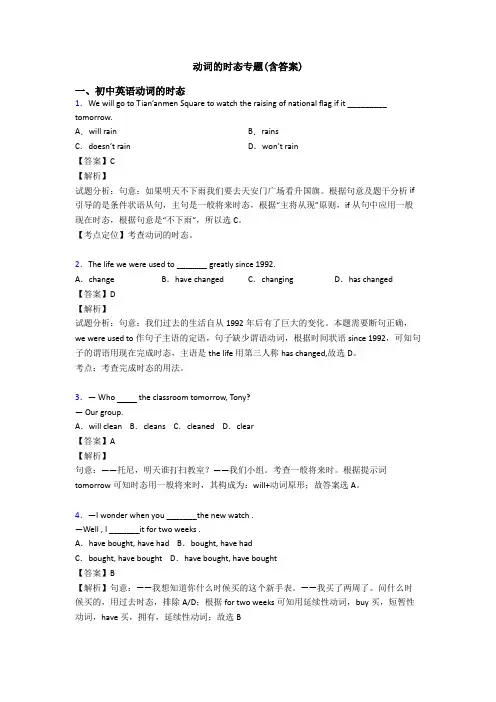
动词的时态专题(含答案)一、初中英语动词的时态1.We will go to Tian’anmen Square to watch the raising of national flag if it _________ tomorrow.A.will rain B.rainsC.doesn’t rain D.won’t rain【答案】C【解析】试题分析:句意:如果明天不下雨我们要去天安门广场看升国旗。
根据句意及题干分析if 引导的是条件状语从句,主句是一般将来时态,根据“主将从现”原则,if从句中应用一般现在时态,根据句意是“不下雨”,所以选C。
【考点定位】考查动词的时态。
2.The life we were used to _______ greatly since 1992.A.change B.have changed C.changing D.has changed【答案】D【解析】试题分析:句意:我们过去的生活自从1992年后有了巨大的变化。
本题需要断句正确,we were used to作句子主语的定语,句子缺少谓语动词,根据时间状语since 1992,可知句子的谓语用现在完成时态,主语是the life 用第三人称has changed,故选D。
考点:考查完成时态的用法。
3.— Who the classroom tomorrow, Tony?— Our group.A.will clean B.cleans C.cleaned D.clear【答案】A【解析】句意:——托尼,明天谁打扫教室?——我们小组。
考查一般将来时。
根据提示词tomorrow可知时态用一般将来时,其构成为:will+动词原形;故答案选A。
4.—I wonder when you _______the new watch .—Well , I _______it for two weeks .A.have bought, have had B.bought, have hadC.bought, have bought D.have bought, have bought【答案】B【解析】句意:——我想知道你什么时候买的这个新手表。
(英语)英语动词的时态常见题型及答题技巧及练习题(含答案)及解析一、初中英语动词的时态1.--I didn't see you at Olympic Sports Centre this morning. What happened?-- Sorry, I the exchange students around our school then.A.showed B.was showing C.am showing D.will show【答案】B【解析】句意:——今天早上我在奥运会体育中心没有看见你。
发生了什么?——对不起,我那时正领着交换生参观我们学校。
根据时间副词then可知此处用过去进行时,故选B。
2.Her son Coke, but now he milk.A.used to drink; is used to drinking B.used to drinking; drinksC.is used to drinking; used to drink D.was used to drink; is drinking【答案】A【解析】【详解】句意:她儿子过去常喝可乐,但现在他习惯喝牛奶。
used to do过去常常做;be used to doing sth习惯于做某事;drinks喝,第三人称单数形式;is drinking现在进行时,根据转折词but,可知前句表示过去喝可乐,后句表示习惯于喝牛奶,故选A。
3.—Shall we play tennis now?—Sorry, I can’t. I my homework.A.do B.did C.have done D.am doing【答案】D【解析】句意:——我们现在打网球去好吗?——对不起,我不能去,我在做作业。
A. do 做,用于一般现在时态,主语复数时; B. did做,用于一般过去时态; C. have done 做,用于一般现在完成时态; D. am doing做,用于现在进行时态,主语是I时;根据now可知用现在进行时态,故选D4.I_______this mobile phone online. It is not worth buying.A.check B.am checking C.have checked D.will check【答案】C【解析】【详解】句意:我在网上查过这部手机。
(英语)初中英语动词的时态专题训练答案及解析一、初中英语动词的时态1.–_____ to the United States?–No, never. But I went to Canada a few years ago.A.Have you been B.Have you goneC.Did you go D.Will you go【答案】A【解析】试题分析:句意:你去过美国吗?没有,但我在几年前去过加拿大。
have/has been to,曾经去过某地,表示有过这种经历; have/has gone to 去了某地,表示某人不在此地;根据题意故用现在完成时;根据句意,故选A考点:考查现在完成时2.The train in an hour. I must go to the train station right now.A.left B.leaveC.will leave D.has left【答案】C【解析】【详解】句意:火车一小时后出发。
我现在必须去火车站。
A. left一般过去时;B. leave一般现在时;C. will leave一般将来时;D. has left现在完成时。
in an hour一个小时后,表示的是将来的时间,因此句子的时态用一般将来时,其构成为will+动词原形,故答案为C。
3.—Why _______ let Tom go to the supermarket with us?—Sorry, he ________ his homework yet.A.you don’t; has finished B.don't; has finishedC.not to; didn’t finish D.no t; hasn’t finished【答案】D【解析】句意:-你为什么不让汤姆和我们一起去超市?-对不起,他还没有完成作业。
你为什么不做某事?Why don’t you do sth?=Why not do sth?主语you与助动词do同时省略或是同时保留。
(英语)初中英语动词的时态专项训练100(附答案)一、初中英语动词的时态1.— May I speak to Judy?— Sorry, she a speech in the hall now.A.makes B.has made C.made D.is making【答案】D【解析】【详解】句意:--我可以让Judy接电话吗?--对不起,她现在在大厅做演讲。
这是打电话用语,指的是现在打电话的时候正在做某事,所以应该用现在进行时。
故选D。
2.--________ you _________ Kate’s letter yet? --Yes, I ________ it for several days. A.Did; receive; have received B.Have; received; have hadC.Have; received; have received D.Did; receive; have had【答案】B【解析】句意:-你收到凯特的信了吗? -是的,我已经收到好几天了。
本题为现在完成时态,receive动词,收到,暂时性动词。
在肯定的陈述句中,暂时性动词不能和一段时间连用,因而receive改为have,have为持续性动词,had过去分词;可以和for several days一段时间连用。
故选:B。
3.―Tom! I you 40 times that I'll beat you if you don't leave that apple jam alone.―Sorry, Aunt!A.tell B.told C.have told D.am telling【答案】C【解析】句意:Tom!我已经警告过你40次,如果你不留下那个苹果酱,我就揍你。
对不起,姑姑!本题考查动词tell(告诉)的时态。
A. tell 动词原形;B. told 一般过去时;C. have told 现在完成时;D. am telling现在进行时。
初中英语动词时态专项练习100题(附答案)( ) 1. Where Uncle Sun yesterday?A. wasB. wereC. didD. does( ) 2. They going to see Mr. Sun tomorrow.A. isB. areC. amD. be( ) 3. Some are in the river and some are games.A. swiming, playingB. swimming, plaiingC. swimming, playingD. swimming, plaing( ) 4. Where is Dick? He to the reading-room.A. has beenB. wentC. has goneD. goes( ) 5. Mark Twain, an American writer, everybody here.A. knowsB. is known asC. is known toD. is known for( ) 6. I hope he will come to see me before he here.A. leaveB. leavesC. will leaveD. left( ) 7. My teacher told me that Australians English.A. spokeB. speakC. speaksD. are speaking( ) 8. I think she right now.A. readingB. readsC. is readingD. read( ) 9. ---- Where are the children?---- They a good time in the garden.A. are havingB. haveC. have hadD. had( ) 10. ----- Where my glasses? I can’t find them.---- I them on the bookshelf, but they aren’t there.A. you put, putB. you have put, have putC. have you put, putD. did you put, have put( ) 11. When the police arrived, the man for 10 minutes.A. diedB. was deathC. had diedD. had been dead( ) 12. By the time this talk is over, we a lot about the earth.A. will be learningB. are learningC. world learnD. will have learnt( ) 13. The teachers told me that they me to smooth away the difficulties.A. helpedB. will helpC. helpD. were going to help( ) 14. ----Have you seen him today?----Yes, I him this morning.A. has seenB. seeC. will seeD. saw( ) 15. He worried when he heard this news.A. isB. wasC. doesD. did( ) 16. What’s your friend going next week.A. doingB. doC. doesD. to do( )17. I don’t think that it’s true. He’s always strange stories.A. tellB. tellingC. toldD. tells( ) 18. Have you ever West Hill Farm?A. gone toB. arrivedC. come toD. been to( ) 19. How long he the novel?A. has, borrowedB. has, keptC. has, lentD. is, using( ) 20. He to do this lessons at eight every evening.A. is beginingB. is beginningC. beginD. begins( ) 21. The children a swim this afternoon.A. are going to hasB. is going to haveC. are havingD. are going to have( ) 22. There a telephone call for my brother Steven yesterday.A. isB. areC. wasD. were( ) 23. he on well with his friends this term?A. Does, getsB. Does, getC. Is, gettingD. Is, geting( ) 24. Who away my pen? I can’t find it.A. haven takenB. takesC. has takenD. took( ) 25. Shall we football this Saturday?A. playB. playingC. playsD. to play( ) 26. The children at school now.A. isB. areC. wasD. were( ) 27. Mr. Smith short stories, but he a TV play these days.A. is writing, is writingB. is writing, writesC. writes, is writingD. writes, writes( ) 28. He said he the league for two years.A. has joinedB. has been inC. had been inD. joined( ) 29. She likes watering trees in the garden, she?A. doesn’tB. don’tC. isn’tD. didn’t( ) 30. What you to do to keep the room clean?A. do, haveB. does, haveC. did, haveD. are, have( ) 31. Some flowers by Kate already.A. have been wateredB. wateredC. have wateredD. has been watered( )32. When winter comes, the leaves fall.A. are going toB. willC. will beD. would( ) 33. I to the cinema. I there every Sunday.A. go, goB. am going, goC. go, am goingD. am going, am going( ) 34. You about the future now, you?A. don’t think, don’tB. aren’t thinking, aren’tC. don’t think, doD. aren’t thinking, are( )35. He was afraid that he his way.A. would lostB. would loseC. is going toD. shall lose( ) 36. We each other since he left here.A. didn’t seeB. hadn’t seenC. haven’t seenD. had seen( ) 37. Mr. Smith out for a walk in the park every day.A. is goingB. goesC. wentD. go( ) 38. He from home for a long time.A. has gone awayB. had gone awayC. has leftD. has been away( ) 39. You mustn’t go too high, or you dangerous. A. will be B. are C. would be D. is going to( ) 40. We have known each other .A. since we were youngB. after we were youngC. when we are youngD. if we are young( ) 41. She promised she do better work.A. wouldB. willC. shallD. is going to( ) 42. How long has this shop ?A. be openB. been openC. openedD. been opened( ) 43. Mr. Smith here since he moved to his city.A. had livedB. have liveC. have livedD. has lived( ) 44. ----Have you read the newspaper?----No, I haven’t .A. tooB. yetC. justD. already( ) 45. Our knowledge of the universe all the time.A. growB. is growingC. growsD. grew( ) 46. She won’t go to the cinema if she the work tomorrow.A. doesn’t finishB. won’t finishC. will finishD. finish( ) 47. My grandma for half a year.A. has been deadB. was deadC. has diedD. died( ) 48. She to the Great Wall several times.A. goesB. has goneC. wentD. has been( ) 49. The earth round the sun.A. moveB. movesC. movedD. will move( ) 50. Liu Fengwei three yuan for the lost library book.A. paidB. spentC. costD. took( ) 51. I the bike for over four years.A. have boughtB. have buyC. have hadD. bought( )52. He told us that he that factory the next day.A. had visitedB. has visitedC. will visitD. would visit( ) 53. His mother the Party last year. She a Party member for a year.A. joined, wasB. has joined, isC. joined, has beenD. has joined, has been( ) 54. We don’t know if it the day after tomorrow.A. will rainB. rainsC. rainedD. would rain( ) 55. He said he his life for his country.A. giveB. gaveC. had givenD. would give( ) 56. He always to the park on Sunday morning.A. goB. goesC. wentD. is going( ) 57. Look, the students to the teacher carefully.A. is listeningB. are listeningC. listenD. listened( ) 58. He in this school in 1958.A. taughtB. has taughtC. teachesD. had taught( ) 59. They said they to England the next day.A. will flyB. had flownC. would flyD. flew( ) 60. They the work in two days.A. had finishedB. would finishedC. is finishingD. will finish( ) 61. By the end of last week, we two thousand words.A. would learnB. have learnedC. had learnedD. were learning( ) 62. When he left, his mother .A. is cookingB. cookedC. was cookingD. cooks( ) 63. We’ll go to play with snow if it tomorrow.A. snowB. snowsC. will snowD. snowed( ) 64. There no milk in the glass.A. haveB. hasC. areD. is( ) 65. The train when we got to the station.A. has just leftB. had just leftC. leavesD. left( ) 66. Dr Smith is not at home. He to work.A. has goneB. has beenC. had beenD. had gone( ) 67. That man knows a lot about New York. I heard he before.A. had gone to the cityB. had been in thereC. had been thereD. had been New York( ) 68. The artist to Europe. He is there now.A. has goneB. has beenC. had goneD. had been( ) 69. Miss Brown said she never to North China before.A. has, goneB. has, beenC. had, goneD. had, been( ) 70. What your grandma this time yesterday?A. is, doingB. was, doingC. did, doD. had, done( ) 71. I to see the film because I have lost my ticket.A. won’t goB. didn’t goC. don’t goD. haven’t gone( ) 72. The students will have a football match if it fine next Saturday.A. will beB. would beC. wasD. is( ) 73. She asked me if I the story before.A. have readB. had readC. would readD. will read( ) 74. What they at eight yesterday evening?A. are, doingB. did, doC. have, doneD. were, doing( ) 75. You can’t see him now because he an important meeting.A. is havingB. haveC. hasD. was having( ) 76. I to my brother since last summer.A. didn’t writeB. hadn’t writtenC. haven’t writtenD. don’t write( ) 77. Li Ping will visit the Great Wall as soon as he free.A. will beB. isC. wasD. has been( ) 78. One day when I the post office I my uncle.A. pass, seeB. was passing, sawC. passed, sawD. pass, saw( ) 79. He he some mistakes in the test.A. said, will makeB. said, madeC. said, had madeD. said, make( ) 80. They tired so they stopped a rest.A. are, haveB. were, haveC. were, to haveD. are, having( ) 81. My father every day.A. takes a walkB. took walkC. take a walkD. is taking a walk( ) 82. Mary is seven years old. She eight next year.A. isB. willC. wasD. will be( ) 83. A table and many chairs made by him yesterday.A. wasB. wereC. are beingD. was being( ) 84. I’ll go with you as soon as I my work.A. will finishB. shall finishC. finishD. finished( ) 85. Trees green in spring.A. turnB. turnsC. would turnD. is turning( ) 86. Yesterday I in bed all day because I had a fever.A. layB. lieC. laidD. lain( ) 87. Hello, Mike. It’s you. I you in Beijing. How long have you been here?A. don’t know, wereB. hadn’t know, areC. haven’t known, areD. didn’t know, were( ) 88. A: When again?B: When he . I’ll let you know.A. he comes, comesB. will be come, will comeC. he comes, will comeD. will he come, comes( ) 89. The last bus . I had to walk home.A. had goneB. have goneC. wentD. has gone( ) 90. A: Are you making cakes? B: .A. Yes, I doB. Yes, I amC. Yes, I’mD. Yes, I’m making( ) 91. ----What time ?----My watch .A. it is, stoppedB. is it, has stoppedC. it is, has stoppedD. is it, is stopping( ) 92. What on Sunday?A. does he sometimes doB. is he often doingC. has he doneD. is usually he do( )93. Did you hear someone at the door when you TV last night?A. knock, was watchingB. knock, watchingC. knock, were watchingD. knock, are watching( ) 94. That Japanese knows the Salt Lake City. I heard he before.A. a lot of, had been thereB. a lot about, had been thereC. lot, had been thereD. a lot of, had gone there( ) 95. As soon as we saw his face, we the news bad.A. knew, wasB. know, wereC. know, wasD. know, were( ) 96. Reading English magazines and newspapers helpful to your study of English.A. isB. areC. willD. is going to do( ) 97. Mary, what doing?A. she isB. are youC. you areD. is( ) 98. A: Is this a new radio? B: No, I it for five years.A. haveB. have hadC. had hadD. will have( ) 99. I’m sure he will come to see me before he Beijing.A. will leaveB. is leavingC. would leaveD. leaves( ) 100. It seemed that he something expensive.A. have lostB. lostC. had lostD. has losted。
初中英语八种时态归纳复习(一)一般现在时(一)定义表示经常性或习惯性的动作,或存在的状态,还表示主语具备的性格和能力及客观真理。
例:I get up at 6:30 in the morning . She is at home .(二)构成主要用动词原形表示,当主语是第三人称单数时,在动词词尾加s/es。
(三)句型1、肯定句:主语+谓语+其他。
She reads English everyday.2、否定句:主语+don’t/doesn’t+谓语+其他。
He doesn’t get up at 6:30 in the morning.3、一般疑问句:Do/Does+主语+V原+其他?Do you like English? Yes, I do. /No, I don’t.4、特殊疑问句:特殊疑问词+do/does+主语+V原+其他?What time do you get up every morning?Where does your father work?(三)用法1、表示经常性或习惯性的动作,或存在的状态,带与表示频率的时间状语如:often , sometimes , usually,always , everyday year,month...), once/twice a week (month, year, etc.), seldom, on Sundays等连用。
I leave home for school at seven every morning.2、表示客观真理,科学事实、格言警句。
The sun rises in the east .日出东方。
The earth goes around the sun .地球绕着太阳转。
Ten minus two is eight.十减二等于八。
Light travels faster than sound .光的速度比声音的速度快。
时态的基本判定方式:一、时间状语同时态的关系:一般情况下,简单句可根据句中的时间状语确定谓语动词的时态。
其判定方式如下:1、句中含有yesterday; last year(last + 具体时间); two days ago(一段时间+ ago); just now; this morning; in 2008(in + 过去的年代); the other day; over the weekend等时间状语时,谓语动词用一般过去时;2、句中含有tomorrow; next week(next +具体时间); in two hours(in +一段时间); (how) soon; from now on; 10 years from now(一段时间+from now); in the future; in 2012(in +将来的年代); by (the end of) next month (by+将来时间); for the weekend; this afternoon; this evening; tonight; this weekend等时间状语时,谓语动词用一般将来时;3、句中既有yesterday等过去时间状语,又有一个具体时间点(at 5:00; this time; at that time)时,谓语动词用过去进行时;4、句中含有recently; in the last/past two years(in the last/past+一段时间); over the years(over the+一段时间); since 2005(since+具体时间或从句); for two years(for+一段时间,句中无其它时间状语); before(单独用于句尾)等时间状语时,谓语动词用现在完成时;5、by (the end of) last year(by+过去时间); two days before(一段时间+before); for和since说明的时间同时用于句中;by the time + 从句(过去时态)等时间状语时,谓语动词用过去完成时;6、简单句中如不含上述时间状语或有含说话时间在内的表示现在时间关系的词语时(如now; today; these days等词),其时态的判定一般按以下步骤进行:------ 句中是否含有表示频率关系的词。
如有,用一般现在时;------ 句子是否说明客观规律。
如是,用一般现在时;------ 句中动词是否表示状况。
如是,用一般现在时;------ 句中动词是否为延续性动态动词。
如是,用现在进行时;------ 句中动词是否为完成性动词(瞬间动词)。
如是,用现在完成时。
二、主从句时态的一致性原则:主从复合句可根据其时态一致性原则,通过主从句中任意一个句子的时态确定另外一个句子的时态;含有时间状语从句的主从句还可通过其引导词所表示的不同时间关系,确定主句和从句的时态。
三、通过上下文关系判定时态:另外我们还可以根据并列谓语的时态一致性原则、问句和答语的时态一致关系、无转折时间的短文时态一致原则等上下文时态的关联以及句子的逻辑关系来判定句子中谓语动词的时态。
Exercise( )1. What _____ you _____ over the weekend?A. will; doB. does; doC. did; doD. were,; doing( )2. Xiao Li usually _____ to school by bike last year.A. goesB. wentC. will goD. is going( )3. What _____ in our town 100 years from now?A. happenedB. is happenedC. has happenedD. will happen( )4. Mr. Smith _____ to see you in an hour.A. came B. has comeC. will come D. comes( )5. _____ you _____ from your parents recently?A. Did; hearB. Have; heardC. Do; hearD. Will; hear( )6. We _____ TV at home this time last night.A. were watchingB. watchedC. have watchedD. would watch ( )7. We _____ over 1500 English words by the end of last month.A. have learnedB. had learnedC. will learnD. learnt ( )8. She _____ in Shanghai for ten years since 1992.A. has livedB. had livedC. livedD. will live( )9. She _____ in Shanghai for ten years. A. has lived B. had lived C. lived D. will live( )10. We all know that the earth _____ round the sun.A. goesB. wentC. is goingD. will go( )11. “Where are the boys?”“They _____ soccer on the playground.”A. playB. are playingC. were playingD. played( )12. Look! Lucy _____ under the tree.A. readsB. is readingC. was readingD. read( )13. He _____ more than 200 model cars in the last five years.A. has collectedB. had collectedC. collectedD. will collect( )14. Jim _____ a letter to his parents at 7:30 last night.A. had writtenB. wroteC. would writeD. was writing ( )15. The Smiths _____ in Beijing since two weeks ago.A. stayedB. were stayingC. would stayD. have stayed ( )16. “When _____ you _____ the bike?”“Last Monday.”A. have; boughtB. did; buyC. will; buyD. do; buy( )17. Look! The boy _____English now. A. likes B. liked C. is liking D. was liking( )18. Most students in our class _____ TV twice a week.A. watchB. watchedC. will watchD. are watching( )19. How soon _____ they _____ back from work?A. do; comeB. did; comeC. have; comeD. will; come( )20. “Where _____ you _____ Mr. Li?”“In his office, half an hour ago.”A. will; seeB. did; seeC. have, seenD. do; see( )21. I _____ a new dictionary. Look! It’s very useful.A. boughtB. will buyC. have boughtD. would buy( )22. I won’t watch the movie tonight. I _____ it before.A. will seeB. have seenC. sawD. had seen( )23. Hello! I _____ know you _____ in Chengdu. How long have you been here?A. didn’t; wereB. don’t areC. didn’t; areD. don’t; were ( )24. He _____ a fire and then cooked a meal.A. had madeB. was makingC. madeD. has made( )25. If I _____ time tomorrow, I will go to visit my grandfather.A. haveB. will haveC. would haveD. am having( )26. I’m going to be a doctor when I _____ up.A. growB. will growC. grewD. am growing( )27. The film _____ on for five minutes when I got to the cinema.A. has beenB. had beenC. wasD. is( )28. She _____ dinner when her son came in.A. has cookedB. had cookedC. was cookingD. would cook ( )29. The train _____ when we got to the station. We had to wait for the next one.A. has leftB. had leftC. leftD. was leaving( )30. He said that he _____ to the barber’s tomorrow morning.A. will goB. wentC. is goingD. would go)31. In the last years I _____ a lot of friends.A. have madeB. madeC. will makeD. was making( )32. The boys _____ for about two hours.A. are playing soccerB. have been playing soccerC. were playingD. play soccer( )33. He _____ so quickly that he could win the race.A. is runningB. will runC. ranD. hadrun( )34. He didn’t go there with us because he _____ there before.A. has beenB. had beenC. wentD. wouldgo( )35. I don’t know if he ______ tomorrow. If he _____, I will tell you.A. will come; will comeB. comes; comesC. will come; comesD. comes; will come( )36. When I was young, my mother told me that the sun _____ in the east.A. riseB. risesC. roseD. hadrisen( )37. “_____ you _____ your work?” “Yes. I finished it an hour ago.”A. Did; finishB. Have; finishedC. Will; finishD.Had; finished( )38. Hurry up, or you _____ the early bus.A. will missB. has missedC. would missD. missed ( )39. I _____ Mr. Green while I _____ along the street last Sunday.A. met; walkedB. was meeting; walkedC. met; was walkingD. was meeting; was walking ( )40. Tom is strong and he _____ to school every day.A. walkedB. walksC. will walkD. haswalked( )41. He said that he _____ with Mr. Black at that time.A. talkedB. was talkingC. is talkingD. wouldtalk( )42. We _____ English in this school since we came here.A. have studiedB. studiedC. had studiedD. werestudying( )43. She _____ at home until her mother came back.A. has stayedB. stayedC. had stayedD. willstay( )44. There will be an interesting movie _____ two days.A. forB. inC. afterD. since ( )45. She _____ there until I came back.A. didn’t leaveB. has stayedC. leftD. wasstaying( )46. It has been raining _____ two hours ago.A. untilB. forC. sinceD. by ( )47. His father _____ since he was two years old.A. has diedB. diedC. has deathD. hasbeen dead( )48. The meeting _____ for ten minutes when I got there yesterday.A. has begunB. had begunC. has been onD. hadbeen on( )49. He had collected over 500 stamps _____ he was twelve years old.A. sinceB. forC. untilD. by thetime( )50. I was doing my homework _____ she rang me up last night.A. whenB. whileC. sinceD. before ( )51. “Where is John?” “He _____ the library.”A. has been toB. has gone toC. has been inD. hasbeen at( )52. How long _____ you _____ the computer?A. have; boughtB. did; buyC. have ; hadD. will;buy( )53. She _____ Shanghai for two days.A. leftB. has leftC. will leaveD. hasbeen away from( )54. He didn’t tell me anything about it _____ he left.A. sinceB. untilC. by the timeD. while ( )55. She _____ China since she was five years old.A. has come toB. has arrived atC. has arrived inD. hasbeen in( )56. I had finished my homework _____ I watched TV last night.A. beforeB. afterC. whenD. until ( )57. Miss White has been _____ the music club for 4 years.A. joiningB. joinC. joinedD. in ( )58. What do you think he will _____ ten years?A. be for B. be atC. be toD. be in( )59. There _____ two football games in our school next week.A. is going to beB. will haveC. will beD. is goingto have( )60. They _____ a birthday party next Friday afternoon.A. is going to beB. will beC. will haveD. is goingto have( )61. How long have you ____ the pen?A. kept B. bought C. borrowed D. got( )62. I _____ Mr. Brown since I left Shanghai in 2004.A. have seenB. sawC. haven’t seenD. didn’tsee( )63. You don’t have to describe her. I _____ her several times.A. had metB. have metC. metD. meet ( )64. I _____ a cold for five days. I still can’t get rid of it.A. caughtB. hadC. have caughtD. havehad( )65. What _____ you _____ at nine o’clock that morning?A. are; doingB. did; doC. were; doingD. had;done( )66. What _____ you _____ by nine o’clock that morning?A. are; doingB. did; doC. were; doingD. had;done( )67. The sign _____, “ No Parking!” A. readsB. was readC. is readingD. read( )68. “_____ you _____ your lunch?” “Yes. I _____ it at school.”A. Did; have; have hadB. Have; had; hadC. Did; have; hadD. Have; had; have( )69. Lily _____ for her mother until she _____ home.A. will wait; will comeB. won’t wait; comesC. will wait; comesD. waits; will come( )70. “Mr. Brown is leaving for a trip.” “Really? Where _____ he _____?”A. has; goneB. will; goC. did; goD. does;go( )71. Tom, you _____ the book for two weeks. You have to return it now.A. borrowedB. have borrowedC. keptD. havekept( )72. “Have you mended your shoes?” “Yes. I _____ it twenty minutes ago.”A. have mendedB. mendedC. had mendedD. willmend( )73. Mr. Smith _____ to China last year and _____ in love with her.A. goes; fallsB. went; fellC. went; feltD. hasgone; fell( )74. If you don’t go to the meeting tomorrow, _____.A. he will, tooB. he won’t, eitherC. he does, tooD. hedoesn’t, either( )75. “Shall we go watching the match?” “Sorry, I can’t. I _____ my homework.”A. doB. have doneC. am doingD. did ( )76. The children won’t go hiking if it _____ next Sunday.A. rainB. rainsC. will rainD. israining( )77. “_____you _____ to Japan?” “Yes. I will go there next month.”A. Have; beenB. Have; goneC. Are; goingD. Did; go ( )78. When I got there, the film _____ for five minutes.A. had been onB. had begunC. was beginningD. began ( )79. Don’t open the door until the bus _____.A. will stopB. doesn’t stopC. is stoppingD. stops ( )80. “_____ you _____ to Japan?” “Yes. We went there last year.”A. Have; beenB. Have; goneC. Did; goD. Are; going参考答案:1-5 CBDCB 6-10 ABBAA 11-15 BBADD 16-20 BAADB21-25 CBACA 26-30 ABCBD 31-35 ABCBC 36-40 BBACB41-45 BABBA 46-50 CDDDA 51-55 BCDBD 56-60 ADDCC61-65 ACBDC 66-70 DABCB 71-75 BBBBC 76-80 BCADA。